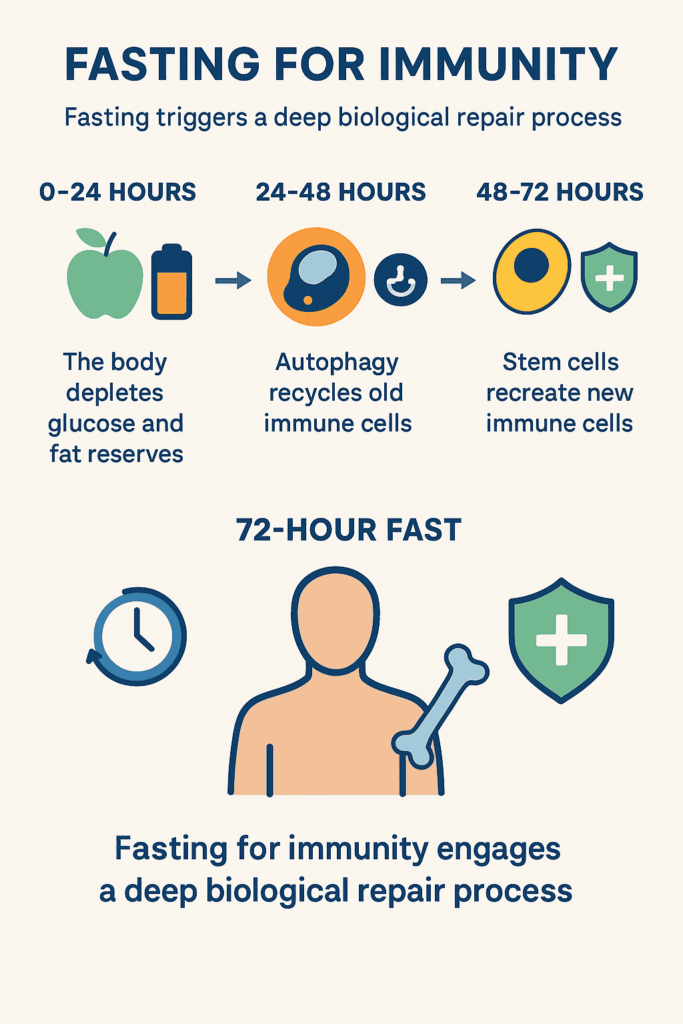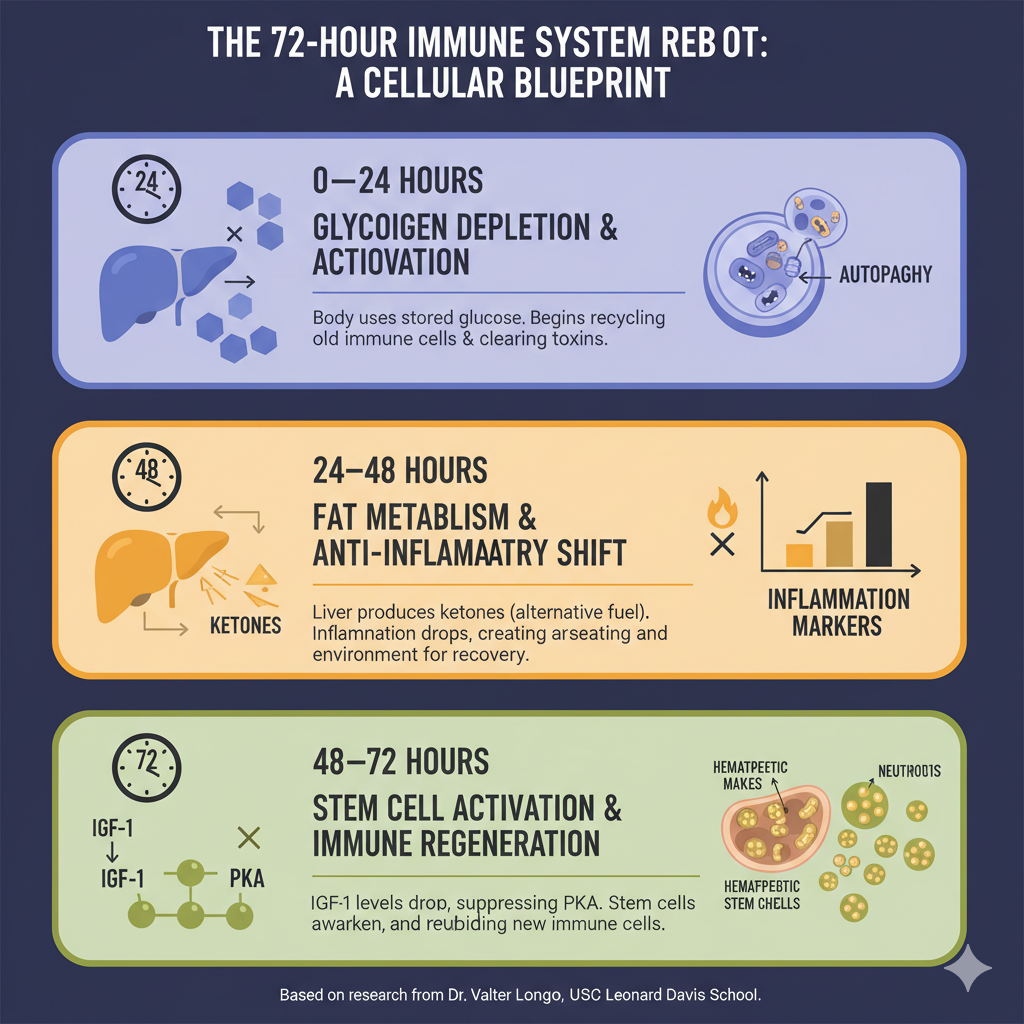When Starvation Becomes Medicine
Every 48 hours, a cancer patient named Maria would stop eating. Not because chemotherapy had robbed her of appetite—but because her oncologist at the University of Southern California (USC) had discovered something remarkable. Patients who fasted before chemotherapy recovered faster, experienced fewer side effects, and rebuilt their immune strength more efficiently than those who didn’t. This wasn’t pseudoscience or ancient myth—it was cutting-edge research proving that fasting for immunity can literally regenerate the body’s defense system.
Dr. Valter Longo and his team at USC’s Leonard Davis School of Gerontology uncovered a biological “reset switch” within our cells. Their study, published in Cell Stem Cell, found that a 72-hour fast could activate dormant stem cells, prompting them to rebuild the immune system from scratch. So, does fasting help with immunity in a way that transforms our understanding of health? Can skipping meals for a few days truly rejuvenate the body at a cellular level? Let’s explore the extraordinary science behind how fasting for immune health works.
How Fasting for Immunity Triggers Cellular Regeneration
Fasting for immunity works by engaging a deep biological repair process—one that has been with us since our hunter-gatherer ancestors faced regular food scarcity. During fasting, as glucose and fat reserves deplete, the body shifts from growth to preservation. This switch suppresses nonessential activities and focuses energy on survival and repair. One of the first systems to adapt is the immune system, which consumes enormous energy to maintain millions of active white blood cells.
At first, the body begins breaking down older or damaged immune cells through a process known as autophagy, meaning “self-eating.” It’s a strategic cleanup—removing inefficient or senescent immune cells that no longer function well. But the real transformation begins when food intake resumes. The 72-hour fast activates a wave of stem cell regeneration. Specifically, hematopoietic stem cells in the bone marrow—the “master builders” of all blood and immune cells—enter a rapid renewal phase.
The USC study showed that this regeneration depends on suppressing a key growth regulator called IGF-1 (Insulin-like Growth Factor 1) and the PKA (Protein Kinase A) pathway. When IGF-1 and PKA activity drop, stem cells shift into repair and renewal mode, producing a brand-new army of immune defenders.

This elegant biological rhythm—breakdown during fasting and rebuilding during refeeding—is what makes fasting for immunity so powerful. It’s a complete immune reboot that helps the body shed damaged cells and replace them with fresh, resilient ones.
Inside the 72-Hour Fast: How Your Body Rebuilds Its Defenses
A 72-hour fast is more than calorie restriction—it’s a physiological reset. Over those three days, several key processes occur sequentially:
- 0–24 hours: Glycogen depletion and autophagy activation
The body uses up stored glucose and begins recycling old immune cells through autophagy. This phase clears debris and toxins from the immune system. - 24–48 hours: Fat metabolism and anti-inflammatory shift
The liver begins producing ketone bodies, an alternative fuel source that also acts as an anti-inflammatory signal. Inflammation markers drop, creating an environment ideal for immune recovery. - 48–72 hours: Stem cell activation and immune regeneration
As the fast deepens, IGF-1 levels plummet, suppressing the PKA enzyme. This reduction signals hematopoietic stem cells to awaken and begin rebuilding white blood cells and other immune components.

When the fast ends and refeeding begins, these new stem cells fully differentiate into healthy immune cells, rejuvenating the entire system. So yes—does fasting help with immunity? The evidence from Dr. Longo’s Cell Stem Cell study and related research strongly suggests it does, especially when fasting is prolonged enough to trigger this regenerative cascade.
Intermittent Fasting for Immunity: A Sustainable Approach
Not everyone can or should attempt a full 72-hour fast. Fortunately, research also supports intermittent fasting for immunity as a gentler, more sustainable strategy that offers many of the same benefits. Intermittent fasting (IF) typically involves cycling between periods of eating and fasting—such as the 16:8 method (16 hours fasting, 8 hours eating) or alternate-day fasting. These shorter fasts still promote autophagy, stabilize blood sugar, and reduce inflammation, all of which support immune balance.
While intermittent fasting may not produce the same deep stem cell regeneration as a 72-hour fast, it does help maintain metabolic flexibility—the ability to switch between glucose and fat as energy sources. This flexibility improves mitochondrial function, reduces oxidative stress, and supports the body’s natural immune rhythm.
As our study on fasting benefits for health outlines, intermittent fasting for immunity can lower chronic inflammation, one of the leading causes of immune dysfunction. For people seeking a sustainable lifestyle approach to fasting for immune health, IF provides an effective, accessible entry point.
Why Fasting for Immunity Matters in Real Life
Chemotherapy and Cancer Recovery
One of the most compelling applications of fasting for immunity comes from cancer research. Chemotherapy damages not only cancer cells but also healthy immune cells. In human pilot trials, patients who completed a 72-hour fast before chemotherapy had faster immune recovery and fewer side effects. Fasting protected healthy cells by lowering IGF-1 and PKA—putting them in a “protective hibernation” state—while leaving cancer cells vulnerable. This dual effect improved treatment outcomes and reduced toxicity.
Aging and Immune Decline
Aging weakens the immune system, leading to increased infections and slower recovery. The USC research revealed that fasting for immunity can reverse some of this decline by rebalancing immune cell ratios.
Older adults tend to produce more inflammatory myeloid cells and fewer adaptive lymphoid cells. Fasting resets this imbalance, generating a more youthful immune profile that’s better equipped to handle new threats.
Chronic Inflammation and Autoimmunity
Chronic inflammation contributes to autoimmune disorders and metabolic diseases. The anti-inflammatory effects of fasting for immune health—mediated by ketone production and cellular cleanup—help restore balance.
While fasting isn’t a cure, it may complement conventional therapies by reducing immune overactivity and supporting healthier cell turnover.
How to Practice Fasting for Immune Health Safely
Before attempting any prolonged fast, consult your healthcare provider. Fasting is not recommended for pregnant women, individuals with eating disorders, or those managing conditions like diabetes, heart disease, or adrenal issues.
Preparation (3–5 days before):
- Transition to whole foods—vegetables, lean proteins, and healthy fats.
- Eliminate processed foods, caffeine excess, and alcohol.
- Stay well-hydrated.
During the Fast:
- Drink water, herbal teas, or mineral-rich broths.
- Supplement electrolytes to prevent imbalances.
- Rest and minimize physical strain.
Refeeding:
- Break the fast with light, easily digestible meals—vegetable soups, broths, and fruits.
- Gradually reintroduce proteins and healthy fats over 24–48 hours.
Gentle refeeding is essential, as this phase completes the regenerative process by supporting stem cell differentiation and restoring nutrient balance.
What We Still Don’t Know About Fasting and Immunity
The science of fasting for immunity is promising but still evolving. Most detailed molecular data come from animal studies, and human research remains limited.
Questions remain: Does fasting help with immunity for everyone, or do genetics, age, and lifestyle create different responses? How often should prolonged fasts be done for optimal results? While a 72-hour fast clearly promotes regeneration, fasting should be seen as a complementary practice—not a replacement for medical care or balanced nutrition.
Awakening Your Body’s Natural Immune Intelligence
The science of fasting for immunity unveils a powerful truth: your body is not static. It’s a self-repairing system designed for renewal when given the right cues.
Through fasting for immune health—whether via a full 72-hour fast or consistent intermittent fasting for immunity—you can tap into biological programs that purge old immune cells, stimulate stem cell regeneration, and rejuvenate your defenses. As Dr. Longo’s research reminds us, sometimes the most profound healing doesn’t come from adding more—it comes from temporarily taking less. Fasting invites your body to remember what it has always known: how to repair, renew, and thrive. learn more on fasting and its connection with sexual health at our page.
